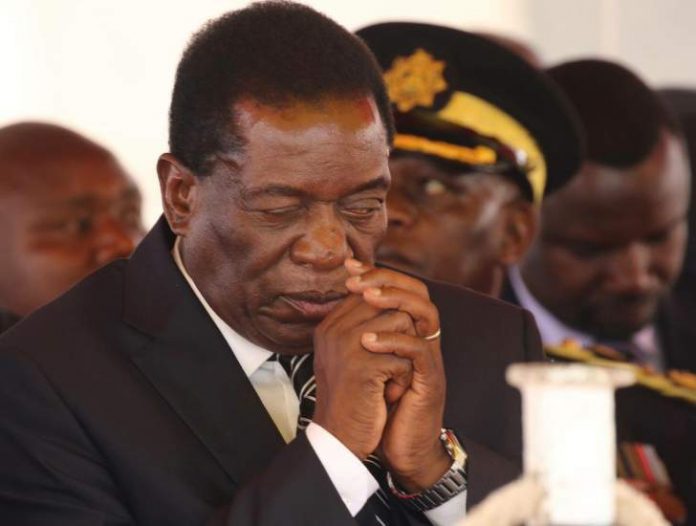
Sydney Kawadza
Former vice president Kembo Mohadi has put the spotlight, once again, on President Mnangagwa, who is expected to perform a Houdini Act when appointing another deputy in government.
President Mnangagwa could have dodged a bullet with Zanu-PF confirming that Mohadi will remain the party’s Second Secretary and Vice President as he had only resigned from government.
However, this may put him in an awkward position as he now has to appoint someone from below the ruling party’s Presidium to be national vice president.
According to the Constitution of Zimbabwe, vice presidents assist the President in the discharge of his functions and perform any other functions, including the administration of any Ministry, department or Act of Parliament, that the President may assign to them.
While the vice presidents are chosen as running mates for the President in an election, and consequently, are nominated from a political party, they automatically assume similar positions in government.
The 6th Schedule in the Constitution is also expected to cover the area of what happens when a vice president resigns from office.
However, President Mnangagwa is still expected to play his cards right in replacing Mohadi, balancing the embodiment of a peace nurturing approach to the next appointment, reinvigorating the party and the posterity of the 1987 Unity Accord between the former Zanu-PF and PF Zapu.
Critical is the need for maintaining the principle of collaborative VP appointments from the perspective of political stability, electoral politics and commitment to solving national problems such as the Gukurahundi.
Further arguments include the need for President Mnangagwa to consider issues of gender and seniority while competence also comes into play when Zimbabweans try to understand the role of the second vice president.
Political analyst Alexander Rusero believes that while Zanu-PF has a wider pool for Presient Mnangagwa to tap from, the Unity Accord will be like an albatross to endure.
“Remember we also have a unity accord in place but it will be good to have a well competent replacement, who is also youthful which will also signal Zanu-PF’s investment in the youths.
“This will also signal Zanu-PF’s investment in the future so they are a lot of considerations but I’m very sure top of these considerations must be things to do with gender, competence and capabilities including the dynamics that Zanu-PF is a combination of the former PF-Zapu and Zanu-PF.”
Professor Nhamo Mhiripiri, another analyst said although the Unity Accord needs to be respected, it is the immediate personalities with a consistent record within PF-Zapu who would have an edge over their colleagues.
“We have to first consider how Zanu-PF is currently constituted especially after 22 December 1987. Kembo Mohadi is occupying a slot allocated to the former PF-Zapu, which united with the former Zanu-PF and created a new Zanu-PF that is the Unity Accord.
“In that Accord or that political contract between the two political parties, the First Secretary, who automatically becomes the President of the State, if Zanu-PF wins an election, has traditionally come from the former Zanu-PF.
“The Second Secretary who becomes the First Vice President of the State is also from the former Zanu-PF people like (Simon) Mzenda, (Joyce) Mujuru and Mnangagwa were nominations from that wing.”
The PF-Zapu wing has provided the late Joshua Nkomo, Joseph Msika, John Nkomo, Phelekezela Mphoko and then Mohadi.
“We might have problems with some of these glamourous politicians like Obert Mpofu because he crossed the floor earlier than the Unity Accord and might be seen like Enos Nkala who stayed in Zanu-PF upon the split in 1963.
“So you might consider those permutations to say, who is the leading person? Is it Sithembiso Nyoni, a lady? Is it Valerio Sibanda, a former combatant, a Zipra combatant, who is now the army general and can also transform from being a security service man into proper politics like what Chiwenga did?”
Mhiripiri noted that former PF-Zapu should be consulting among themselves and make submissions to Mnangagwa who is the appointing authority in both the party and government.
“He (Mnangagwa) will have to consider the submissions and if he sees the person as capable of working with him smoothly that is when he endorses. So the executive presidency will come into play once again,” he said.
However, Mhiripiri said, Mohadi’s resignation gives Zanu-PF the opportunity to cater for Southern Zimbabwe constituency to have representation in the highest organ of both the party and government.
He said Mnangagwa’s choice would not be easy to make although there might be a need a revival of national politics, where in terms of the Unity Accord, the First Secretary of Zanu-PF comes from the former PF-Zapu.
“The Accord could be revised where it is open for contestation across the board without the limitations. That is the Zanu-PF of the future where someone from Matabeleland will not only see herself or himself as worth of being a vice president.”
On the perspective of transitional management and transformative politics, University of Zimbabwe lecturer, Sharon Hofisi said the unavailability of a manual on Presidential appointments on the vice presidents, it is informally known that he will appoint a senior from the former PF-ZAPU.
“However, the idea of embodying a peace nurturing approach remains critical as it shows an inclination for posterity,” he said.
Maintaining the principle of collaborative vice presidents appointments is important from the perspective of political stability, electoral politics and commitment to solving national problems such as Gukurahundi, he stated.
“Proceeding in the relationship between the party and government from the perspective of the Unity Accord requires a precise assessment of the candidates to be appointed. The President should steer his appointment through the party, Unity Accord and state constitution. Off course decisions from the Politburo as the political vanguard have to be considered.”
The post-conflict justice or transformative transitional justice perspective also brings in the argument that Mohadi played a critical role in ensuring that Gukurahundi issues are dealt with effectively.
Hofisi also argues that this would be in respect of the Gukurahundi victims, their families and the perspective of both horizontal and vertical accountability on the part of the alleged perpetrators.
“You would understand that the President actually operationalised national healing and reconciliation in 2018 and beyond the operationalization, you would want to see victims actually being capacitated.
“Capacitated in terms of access psycho-social support, in terms of ensuring that maybe we essentialize issues to do with memorialization, reconstruction of the memory, looking seriously to issues such as the reburials to ensure that’s there is cooperation between government and communities that’s were affected.”
Party structures would be very significant with most senior former PF-Zapu expected to keep the 1987 Unity Accord for reasons of posterity.
“Once we consider those reasons of posterity, I am sure the President’s decision whether we are saying it is already a script that has been written or whether we say they are still consultations to be made, l think it must be one which also considers the Unity Accord, the party and the nation, at large,” he said.
Mohadi’s resignation also provides ample opportunity for stakeholders, beneficiaries, practitioners in transformation transitional justice and transformative change management to embrace the event.
There is also need for unity to ensure that the move contributes immensely to political stability, psycho-social support and even information that will ensure what Mohadi was doing will not be a white elephant but actually be put to good use for the good of the nation.















